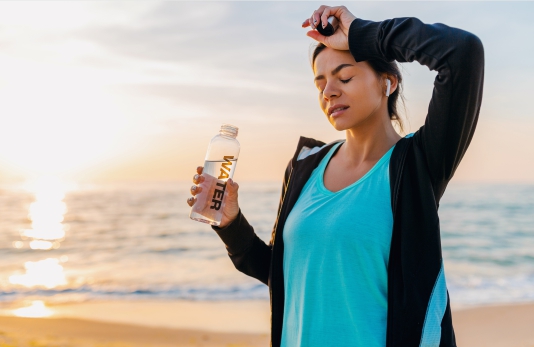Do you experience headaches frequently during the summer months?
Many people do feel the same, and one reason for this could be dehydration.
When our bodies don’t have enough water to function, they might show prominent signs indicating dehydration, including Headache, Dry tongue & mouth, Flushing of the skin, Fatigue & extreme tiredness, Dizziness, Muscle cramps, Loss of appetite, Excessive thirst, Dark-colored urine, or Constipation.
In this article, let’s explore the impact of dehydration in the summer and ways to prevent it.
Impact Of Dehydration In Summer?
Dehydration happens when your body does not have the water it needs to function properly.
Before that, understand the importance of hydration:
Water constitutes approximately 60% of the human adult body and is essential for various physiological processes, including:
- Regulating body temperature
- Facilitating the transportation of essential nutrients
- Helping in the removal of toxins and waste products
During hot and humid weather, the risk of dehydration increases significantly.
When it’s really hot, we sweat more, which makes us lose water faster, thereby making us more vulnerable to dehydration.
Apart from sweating, other factors contributing to fluid loss in our bodies include vomiting, diarrhea, or increased urination.
In severe cases of dehydration, it can cause heat-related illnesses like heat cramps, heat exhaustion, or life-threatening heat stroke (sunstroke).
Who Needs to Be More Aware?
Dehydration can happen to anyone, as mentioned above. However, it is particularly threatening for infants, young children, older adults, and people engaging in outdoor activities or sports.
There are three stages of dehydration – mild, moderate, and severe, and the time taken to recover varies accordingly. In general, it can take up to 3 days to recover.
Ways To Prevent Dehydration in The Summer?
- To avoid dehydration-related complications, particularly during the summer season, prevention is key. To do so, follow these hydrating tips:
- Carry a water bottle wherever you go, and drink an adequate amount of water every day. Remember to sip water throughout the day rather than consuming large amounts at once.
Do you know how much water you should drink a day during the summer months?
It varies depending on your age, weight, and activity levels. Here are recommendations for water intake during the summer months:
Based on Age:
- Children (4-8 years old): 6-8 cups (1.4-1.9 liters) per day
- Boys/Girls (9-13 years old): 8-10 cups (1.9-2.4 liters) per day
- Teenagers (14-18 years old):
Boys: 10-14 cups (2.4-3.3 liters) per day
Girls: 9-11 cups (2.1-2.6 liters) per day
- Adults (19 years and older):
Men: 13-15 cups (3.1-3.5 liters) per day
Women: 10-12 cups (2.4-2.8 liters) per day
- Older Adults (65 and older):
Men: 10-13 cups (2.4-3.1 liters) per day
Women: 8-11 cups (1.9-2.6 liters) per day
Based on Weight:
The recommended intake is 1 liter for individuals weighing 20 kg.
For instance:
- Children can drink 8 glasses of water.
- Men can drink approximately 3 liters of water.
- Women can drink approximately 2 liters of water.
Based on Activity Level:
- Drink 17 to 20 ounces of water 2 hours before and after engaging in heavy physical activity.
- While exercising, drink 7 to 10 ounces of water every 10 to 20 minutes.
However, be careful not to overdrink, as it may cause water intoxication or Hyponatremia, especially for people with kidney problems. Also, individuals with certain medical conditions, such as diabetes or heart disease, should be particularly cautious about maintaining hydration levels.
If you’re bored of drinking plain water, add slices of lemon, or cucumber to add flavor.
General Tips To Beat The Heat:
- Opt for light-colored, loose-fitting clothing made of breathable fabrics like cotton to prevent excessive sweating.
- Avoid going outside, especially between 10 AM to 2 PM when the sun’s rays are most intense.
- Include water-rich foods such as watermelon, cucumber, and strawberries in your diet.
- Prefer to drink natural juice without added sugar. Coconut water in the morning can help you stay hydrated.
- Wear sunglasses and hats, and apply sunscreen when going outside.
- Limit the consumption of tea, coffee, and other caffeinated drinks.
- Avoid or limit the intake of alcohol, aerated drinks, and soda.
Severe Dehydration Needs Medical Attention
If you experience any of the following symptoms, it indicates a critical condition that needs immediate medical attention.
- A temperature of 103 degrees Fahrenheit
- Been vomiting or inability to keep down any fluids
- Muscle twitching
- Dizziness, fainting, or loss of consciousness
- Confusion or slurred speech
Stay hydrated, stay vigilant, and prioritize your health by recognizing and addressing signs of dehydration before they escalate into medical emergencies.

